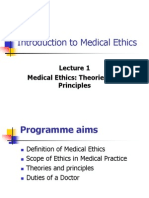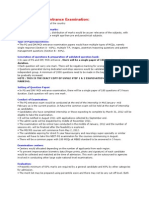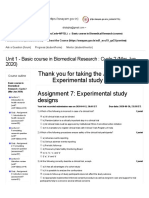5783 PDF PDF
5783 PDF PDF
Uploaded by
DeepuCopyright:
Available Formats
5783 PDF PDF
5783 PDF PDF
Uploaded by
DeepuOriginal Title
Copyright
Available Formats
Share this document
Did you find this document useful?
Is this content inappropriate?
Copyright:
Available Formats
5783 PDF PDF
5783 PDF PDF
Uploaded by
DeepuCopyright:
Available Formats
SHAH ET AL : MEDICOLEGAL ISSUES IN DENTISTRY WORLD J ADV SCI RES
Medicolegal Issues in Dentistry
Dr. Rohit Shah*
*Reader, Dept. of Periodontology, Terna Dental College, Nerul, Navi Mumbai
Medicolegal is an upcoming branch which involves a combination of issues encompassing the medical
and the legal fields. Practically it involves informed consent, medical negligence, deficiency in service and civil
compensation for the same.
A vast majority of medicolegal cases could be attributed to alleged incompetence of the medical
professional.
Incompetence is the inability to do something successfully. The standards of incompetence could be
listed as follows -
1. Inability to express or communicate a preference or choice.
2. Inability to understand one’s medical condition and its consequences.
3. Inability to understand or comprehend relevant information.
4. Inability to give a (rational) reason for a negligence or a failure
5. Inability to give risk/benefit related reasons.
6. Inability to reach a reasonable decision.
However the key element in medicolegal cases has always been “Informed Consent”.
Consent is to agree or give permission. It is an agreement, compliance or permission given voluntarily without
any compulsion.
Consent has the elements of being voluntary, providing knowledge, the patient having the capacity for decision
making and the patient being competent.
VOL. 1 ISSUE 1 SEPTEMBER 2018 76
SHAH ET AL : MEDICOLEGAL ISSUES IN DENTISTRY WORLD J ADV SCI RES
Commonly consent is implied (understood when patient sits on a dental chair to be examined), expressed
(written or oral), informed (most ideal type), presumed (in emergency cases), tacit (passively or silently),
proxy (parents of children, special child, unconscious patient).
A doctor who does not take consent may be liable both to legal action by the patient and to action by their
professional body (DCI). Touching a patient without a valid consent (in the language that the patient
understands) may constitute the criminal offence of battery.
Patients have a right to know if their lifestyles may be compromised by side effects of the treatment
and this needs to be taken into consideration by the patient before deciding whether or not to proceed with
treatment.
Patients need to have sufficient knowledge of -
1. The purpose of dental treatment
2. The nature of the treatment (what it involves)
3. The likely effects and consequences
4. Risks, limitations and possible side effects
5. Alternatives and how they compare
6. Costs
Blanket consent forms are no longer acceptable. They need to be treatment specific.
The informed consent form should include:
1. Legal name and date of birth of patient.
2. Patient’s diagnosis.
3. Nature and purpose of the proposed treatment in simple terms.
4. Potential benefits and risks associated with that treatment.
5. Professionally recognized or evidence based alternative treatment including no treatment to recommended
therapy and risk(s).
6. Place for patient to indicate that all questions have been asked and adequately answered.
VOL. 1 ISSUE 1 SEPTEMBER 2018 77
SHAH ET AL : MEDICOLEGAL ISSUES IN DENTISTRY WORLD J ADV SCI RES
7. Places for signatures of the patient or legal guardian, dentist, and an office staff member as a witness.
Documentation and good record keeping (case paper, dental casts, dental photographs, xrays) go a long
way in protecting a dentist in medicolegal cases.
Consent should be obtained for any visual or audio recording, including photographs or other visual
images of the patient.
Statements like “I accept this treatment with the understanding that I will hold the doctor harmless for
any negligence in the performance of the treatment” are deemed invalid by most courts.
An individual with capacity is entitled to withdraw consent at any time, including during the performance of a
procedure.
LADA – Leaving against Dental Advise – similar to LAMA – simply means that the patient does not follow the
recommendations of the attending dentist especially in terms of treatment planning.
When a person gives valid consent to an intervention, in general that consent remains valid for an
indefinite duration, unless it is withdrawn by the person.
However, if new information becomes available regarding the proposed intervention, the doctor or
member of the healthcare team should inform the patient and reconfirm their consent.
Similarly, if the patient’s condition has changed significantly in the intervening time it may be
necessary to seek consent again, on the basis that the likely benefits and/or risks of the intervention may also
have changed.
A majority of medicolegal cases also involve the charge of Negligence by the doctor.
Negligence –
Dental Negligence is a civil wrong which means a lack of proper care and attention; culpable carelessness. It is
commonly found to happen when the dentist attempts something heroic - beyond his capacity and/or attempts
something unreasonable in the greed of money.
The three essential components of negligence are:
• Doctor has a duty of care for their patients
• There is a Breach of that care
• There is Resulting Damage due to that breach
A simple lack of care, an error of judgment or an accident is not a definite proof of negligence on part of the
health professional.
VOL. 1 ISSUE 1 SEPTEMBER 2018 78
SHAH ET AL : MEDICOLEGAL ISSUES IN DENTISTRY WORLD J ADV SCI RES
As long as the doctor follows a practice acceptable to the profession of that day, he cannot be held liable for
negligence merely because an alternative course or method of treatment was also available.
A Dentist who undertakes any treatment is understood to be possessing the sufficient skills, knowledge and
training to perform the treatment. (Eg – A clinician placing implants needs to be sufficiently trained in
implantology, weekend Implant Crash Courses may not be accepted as sufficient training by practising Judges).
A professional may be held liable for negligence on one of the two findings:
1) Either he/she was not possessed of the requisite skill which he/she professed to have possessed or
2) He /she did not exercise with reasonable competence in the given case, the skill which he/she
possessed.
• The onus is on the patient to prove not only that they are a victim of negligent service but that they
have also suffered damage in the process.
• A Foreign Body like Amalgam in tooth sockets, broken RC instruments, bur tips in bone can invite
negligence allegations as can accidental ingestion of crowns or dental instruments etc.
• Even in case of cardiac arrest, the dentist must remain with the patient and try for resuscitation.
NON Negligent ACTS
• Not providing an ambulance, due to un-availability.
• Not obtaining a consent form in an emergency.
• Patient’s dissatisfaction with progress of treatment.
• Giving preference of one patient over the other based on priority.
Court Cases have been filed on the following issues -
• Charging what the patient thinks is exorbitant.
• Patient not getting the desired relief.
• Most common malpractice issues involve a failure to diagnose, treat or a timely reference or involving
a general dentist’s attempt to treat beyond their level of competence.
Duties of a doctor include – Duty of Care in deciding whether to undertake the treatment, treatment
planning and administrating ethically morally and wisely the best treatment possible to all of their
patients.
VOL. 1 ISSUE 1 SEPTEMBER 2018 79
SHAH ET AL : MEDICOLEGAL ISSUES IN DENTISTRY WORLD J ADV SCI RES
The dentist is expected to bring a REASONABLE DEGREE of STANDARD of CARE &
COMPETENCE for their patients as required by law.
• A dentist can't be punished for choosing a line of treatment which they felt was better, but failed and
there was an alternate line of treatment option available.
• Tortuous Liability - When a dentist is directly liable for an act of negligence in his clinic or hospital it
is called primary liability and they will have to compensate the victim by paying generally the cash,
awarded by a court.
• Criminal Liability - It is a penal provision and involves punishment in the form of imprisonment or
fine or both. Some of the provisions are -
• Section 304 A Indian Penal Code (IPC) – Negligent homicide.
• Sec 336 (IPC) - An act endangering the life of a person (even if there is no injury), e.g. extracting a
tooth for a patient with valvular heart disease without antibiotic prophylaxis against endocarditis
• Sec 337 (IPC) - A rash or negligent act causing simple injury, e.g. pain and swelling after removal of a
tooth due to a negligent extraction.
• Sec 338 (IPC) - A rash or negligent act resulting in grievous injury, e.g. fracture of jaw during
extraction due to excessive or improper force.
Common Alleged Negligence Examples -
• Complications due to extractions
• Infections requiring hospitalization.
• Sinus perforation
• Extraction of wrong tooth
• Separated instruments in canals, bur tips in bone and amalgam in tooth sockets
• Unrestorable implants
• Failed Implants
• Misdiagnosis and/ or Failure of treatment planning
• Substandard crowns and bridges
• Open margins, overhanging restorations
VOL. 1 ISSUE 1 SEPTEMBER 2018 80
SHAH ET AL : MEDICOLEGAL ISSUES IN DENTISTRY WORLD J ADV SCI RES
• Poor Occlusion
• Deficiency in Care - If the dentist causes a Nerve Injury or carries out a wrong removal of teeth then it
would be termed failure to take care of the patient.
• Abandoning a Patient: The contract between the Dentist and the Patient ends only on completion of
treatment or on referral and acceptance by another dentist.
• A Dentist is duty bound to recognize the need and time to make a referral to a specialist, who shall be
best suited to treat/ manage the patient.
• Similarly the dentist is bound to refer the patient to a physician for medical opinion/ consultation and
treatment of the patient’s underlying systemic status.
• Any act done in good faith for the patient is exempt from clauses of negligence.
• However Failure to adequately explain the procedure and its outcome to the patient in the language
they understand is a negligent act.
• Certificate: Issuing false or incorrect certificates constitutes serious misconduct and criminal
liabilities.
• Confidentiality: The Dentist is ethically bound by confidentiality of their patients and legally also
needs to maintain the same.
• When the patient doesn’t follow instructions and the required post treatment follow-up is not
maintained, it can be termed as Contributory negligence on the part of the patient.
Prevention Against Negligence -
• Be up-to-date and abreast of the current and newer treatment modalities
• Exercise reasonable care and skill
• Keep accurate and complete records
• Employ qualified staff and associates
• Obtain valid INFORMED consent
Complaints – In case of a medicolegal complaint filed, the dentist needs to acknowledge, clarify and
investigate the complaint. If possible, the dentist should compromise, negotiate and settle the matter
VOL. 1 ISSUE 1 SEPTEMBER 2018 81
SHAH ET AL : MEDICOLEGAL ISSUES IN DENTISTRY WORLD J ADV SCI RES
immediately with the patient. If not possible, the dentist should take help from senior colleagues,
association members, an advocate experienced in dealing with medicolegal matters, indemnity advisors
and immediately act on the same. Maintaining followups and confidentiality is the key.
In case of a medicolegal claim, the dentist needs to gather all the documentation of the patient,
their consent form, case records, investigation reports, patient’s xrays. The dentist should not tamper
with any patient records and should not discuss the same, especially on social media. Patient records
should not be misplaced or destroyed. The dentist should avoid discussing with the patient or their
representatives and also avoid arguments and admitting to his faults or offering baits like waiving of
fees. A professional advocate should be consulted and the records produced and the claim should be
handled in the proper legal way.
Conclusion – Dentists now need to understand that facing lawsuits is now becoming increasingly
common in India too and they need to prepare themselves for the same too. Keeping adequate patient
case records, having sufficient medicolegal knowledge, keeping informed consent forms, taking a
professional indemnity insurance policy, maintaining communication with the patient at all times,
having sufficient knowledge, skills, training for the treatment procedures that they employ and
maintaining sufficient precautions is the need of the hour for a successful clinical practice.
References -
1. Medical law for dental surgeon by George Paul, chapter no 5, pg no 29.
2. Nayak RK. Consumer Protection Law in India, the Indian Law Institute, 1991. Tripathi NM Pvt.
Ltd.
Acknowledgement – The author remains indebted to Dr. Bhavdeep Singh Ahuja for being a source
of inspiration and for his support, guidance and mentorship without which this article would not have
been possible. The article remains a brief gist and is an attempt to summarize all his teachings till date.
VOL. 1 ISSUE 1 SEPTEMBER 2018 82
You might also like
- AxiUm ManualDocument28 pagesAxiUm Manualscribd@iamdooser.orgNo ratings yet
- Assignment 2 PDFDocument9 pagesAssignment 2 PDFNihar AddagarlaNo ratings yet
- Written Examination Handbook For General Dentistry May 2021-MinDocument20 pagesWritten Examination Handbook For General Dentistry May 2021-MinMuhammad Hassan memonNo ratings yet
- M Paed DentDocument1 pageM Paed DentAnkita AroraNo ratings yet
- Indices: Preventive and Community DentistryDocument29 pagesIndices: Preventive and Community DentistryReshmaaRajendran100% (1)
- Intro Med Ethics 4 TH YearDocument31 pagesIntro Med Ethics 4 TH YearMu Rab100% (1)
- Low Risk Research Ethics Application Form 2013/14Document11 pagesLow Risk Research Ethics Application Form 2013/14toobaziNo ratings yet
- Chapter 05: Legal Principles in Nursing Potter: Essentials For Nursing Practice, 9th EditionDocument13 pagesChapter 05: Legal Principles in Nursing Potter: Essentials For Nursing Practice, 9th EditionJohnNo ratings yet
- EthicsDocument54 pagesEthicsMehek BatraNo ratings yet
- Legal Principles: Jurisprudence: Ethical, Legal, and Practical Matters in The Management of Periodontal PatientsDocument7 pagesLegal Principles: Jurisprudence: Ethical, Legal, and Practical Matters in The Management of Periodontal PatientsSri HariNo ratings yet
- Activity Measures of AssoDocument6 pagesActivity Measures of Assodwata100% (1)
- MCQs On Tobacco Abuse NEET 2024Document2 pagesMCQs On Tobacco Abuse NEET 2024mohammadalirizwan423No ratings yet
- Biostatistics Word NewDocument43 pagesBiostatistics Word NewMereesha K MoideenNo ratings yet
- Pharmacovigilance Paper PDFDocument19 pagesPharmacovigilance Paper PDFHassan Ahmed KhanNo ratings yet
- 1 - Ahmed Sle MCQ Endo PDF Dentin MouthDocument1 page1 - Ahmed Sle MCQ Endo PDF Dentin Mouth9snqnq42xxNo ratings yet
- Oral Potentially Malignant Disorders Healthcare Professional Training English Version - CompressedDocument120 pagesOral Potentially Malignant Disorders Healthcare Professional Training English Version - CompressedClaudio MaranhaoNo ratings yet
- Zambia Consolidated Guidelines For Treatment and Prevention of HIV Infection 2020 PDFDocument139 pagesZambia Consolidated Guidelines For Treatment and Prevention of HIV Infection 2020 PDFChimbwe PhiriNo ratings yet
- The Interprofessional Approach To Patient ManagementDocument16 pagesThe Interprofessional Approach To Patient ManagementDarwin D. J. Lim100% (1)
- Management of Class I Type 3 Malocclusion Using Simple Removable AppliancesDocument5 pagesManagement of Class I Type 3 Malocclusion Using Simple Removable AppliancesMuthia Dewi100% (1)
- Radiation Oncology Patient Safety FinalDocument4 pagesRadiation Oncology Patient Safety Finalapi-645453685No ratings yet
- Ethics, Jurisprudence, andDocument61 pagesEthics, Jurisprudence, andRavula Vasudeva Reddy100% (1)
- NEW Online Exam Guideline 2020Document87 pagesNEW Online Exam Guideline 2020arezooNo ratings yet
- Maternal Practices Towards Dental Treatment of Primary School Children After The Emergence of Covid 19Document6 pagesMaternal Practices Towards Dental Treatment of Primary School Children After The Emergence of Covid 19International Journal of Innovative Science and Research TechnologyNo ratings yet
- 02 Mpaed Dent RegsDocument6 pages02 Mpaed Dent RegsBiswaroop ChandraNo ratings yet
- Cheklist 2016Document3 pagesCheklist 2016Ida Yustina FalahiNo ratings yet
- Squared Ranks For VarianceDocument7 pagesSquared Ranks For VarianceHadia Azhar2558No ratings yet
- Chapter 8 Hospital Pharmacy Notes Complete Notes by Noteskarts Acc To ER20Document20 pagesChapter 8 Hospital Pharmacy Notes Complete Notes by Noteskarts Acc To ER20Shamant TNo ratings yet
- DENTAL JURIS - Growth of Dental Legislation PDFDocument3 pagesDENTAL JURIS - Growth of Dental Legislation PDFIsabelle TanNo ratings yet
- Evidence Based DentistryDocument5 pagesEvidence Based DentistrySaumyaGc_singhNo ratings yet
- Ethical Considerations in Research NIGEL MATHERS, AMANDA HOWE, AMANDA HUNN PDFDocument42 pagesEthical Considerations in Research NIGEL MATHERS, AMANDA HOWE, AMANDA HUNN PDFMatei Marian100% (1)
- HBV, HCV, and HIV in The Dental Office Prevention and Recommendations For Post Exposure Prophylaxis (PEP)Document71 pagesHBV, HCV, and HIV in The Dental Office Prevention and Recommendations For Post Exposure Prophylaxis (PEP)Rajneesh JindalNo ratings yet
- Construction of MCQ SDocument6 pagesConstruction of MCQ Smuhammad sajidNo ratings yet
- Knowledge, Attitude and Practice Towards COVID-19 Vaccination Among Adults of Sullia Taluk in Dakshin Kannada District of Karnataka - A Community Based Survey)Document8 pagesKnowledge, Attitude and Practice Towards COVID-19 Vaccination Among Adults of Sullia Taluk in Dakshin Kannada District of Karnataka - A Community Based Survey)International Journal of Innovative Science and Research TechnologyNo ratings yet
- ProposalDocument5 pagesProposalapi-354921474No ratings yet
- Dental Avulsion of A Maxillary Central Incisor: A Case ReportDocument5 pagesDental Avulsion of A Maxillary Central Incisor: A Case ReportadiNo ratings yet
- Evidence Based DentistryDocument7 pagesEvidence Based DentistryAnwar AbbasNo ratings yet
- 6 Understanding and Managing Clinical RiskDocument4 pages6 Understanding and Managing Clinical Riskanojan100% (1)
- OS Pre Prof JsmuDocument2 pagesOS Pre Prof JsmudaneshkumarytcNo ratings yet
- Caries and Quality of Life in Portuguese Adolescents: Impact of Diet and Behavioural Risk FactorsDocument6 pagesCaries and Quality of Life in Portuguese Adolescents: Impact of Diet and Behavioural Risk FactorsCristian OneaNo ratings yet
- First AID For The USMLE Public HealthDocument20 pagesFirst AID For The USMLE Public HealthLilit M-yanNo ratings yet
- Concept Analysis of Interdisciplinary PDFDocument11 pagesConcept Analysis of Interdisciplinary PDFCharles JacksonNo ratings yet
- Organ Donation FINAL Indore 2Document40 pagesOrgan Donation FINAL Indore 2DeepanNo ratings yet
- Gingival Surgery Techniques LastpptDocument39 pagesGingival Surgery Techniques LastpptHaneen Al-HajjNo ratings yet
- A Review of Use of AntibioticsDocument15 pagesA Review of Use of AntibioticsInternational Medical Publisher0% (1)
- Maturity Based Graded Accreditation and Binary AccreditationDocument44 pagesMaturity Based Graded Accreditation and Binary AccreditationVividh Pawaskar100% (1)
- Fluoridation - Seminar TopicDocument4 pagesFluoridation - Seminar Topicnawafaslam100% (1)
- BSDH Domiciliary Guidelines August 2009Document40 pagesBSDH Domiciliary Guidelines August 2009joquitoNo ratings yet
- Neet SampleDocument18 pagesNeet SampledrpnnreddyNo ratings yet
- MCQS PapersDocument78 pagesMCQS PapersSalman AhmadNo ratings yet
- Third Molar Factors Predictive of Difficult Impacted Third Molar SurgeryDocument6 pagesThird Molar Factors Predictive of Difficult Impacted Third Molar SurgerydrsondosNo ratings yet
- Greater Palatine ArteryDocument9 pagesGreater Palatine ArterySuli M ENo ratings yet
- Pre-And Postoperative Management Techniques. Before and After. Part 1: Medical MorbiditiesDocument6 pagesPre-And Postoperative Management Techniques. Before and After. Part 1: Medical MorbiditiesMostafa FayadNo ratings yet
- Oral and Dental TraumaDocument101 pagesOral and Dental TraumaAlex Burde100% (1)
- How To Write MCQ QuestionsDocument5 pagesHow To Write MCQ Questionsthiên lữNo ratings yet
- NEET PG 2012 Entrance Examination and PatternDocument4 pagesNEET PG 2012 Entrance Examination and PatternManish Chandra Prabhakar100% (1)
- Nbde02 FaqDocument11 pagesNbde02 FaqHKNo ratings yet
- 07.experimental Study DesignsDocument2 pages07.experimental Study DesignsstNo ratings yet
- BDA AdvicesheetDocument16 pagesBDA AdvicesheetMallika RastogiNo ratings yet
- Oral PathologyDocument3 pagesOral PathologyKhadim Shah0% (1)
- Surgical Complications in Oral Implantology: Etiology, Prevention, and ManagementFrom EverandSurgical Complications in Oral Implantology: Etiology, Prevention, and ManagementNo ratings yet
- Greenify: Real-World Missions For Climate Change EducationDocument7 pagesGreenify: Real-World Missions For Climate Change EducationDeepuNo ratings yet
- Video Process CommunicationsDocument4 pagesVideo Process CommunicationsDeepuNo ratings yet
- Android Permissions: User Attention, Comprehension, and BehaviorDocument14 pagesAndroid Permissions: User Attention, Comprehension, and BehaviorDeepuNo ratings yet
- Semantics Aware MalwareDocument15 pagesSemantics Aware MalwareDeepuNo ratings yet
- Decoding Android MalwareDocument15 pagesDecoding Android MalwareDeepuNo ratings yet
- Dental JurisprudenceDocument6 pagesDental JurisprudenceDeepuNo ratings yet
- Android Permissions Demystified PDFDocument11 pagesAndroid Permissions Demystified PDFDeepuNo ratings yet
- School ListDocument1 pageSchool ListDeepuNo ratings yet
- Double Pot MethodDocument8 pagesDouble Pot MethodDeepu50% (2)
- Law 421 Entire CourseDocument9 pagesLaw 421 Entire CourseAdamNo ratings yet
- Mental Health ActDocument20 pagesMental Health ActBiswas AruNo ratings yet
- Palmer - Final CoachingDocument9 pagesPalmer - Final CoachingDonald SebidanNo ratings yet
- Ethics ExamDocument6 pagesEthics ExamSarte Rachelle AnneNo ratings yet
- 2017 2018 Ethics Checklist 1Document2 pages2017 2018 Ethics Checklist 1guruphargillNo ratings yet
- AWMA 2011 Standards For Wound Management v2Document36 pagesAWMA 2011 Standards For Wound Management v2Agung Ginanjar100% (1)
- Data Privacy ActDocument7 pagesData Privacy ActJude ChicanoNo ratings yet
- Privacy Notice New Career SiteDocument5 pagesPrivacy Notice New Career SiteIsmail Ali AhamedNo ratings yet
- Legal Issues CHNDocument17 pagesLegal Issues CHNSamjhana NeupaneNo ratings yet
- Prof. Herkutanto - Informed Consent Sebagai Pencegahan Tuntutan 2017Document33 pagesProf. Herkutanto - Informed Consent Sebagai Pencegahan Tuntutan 2017muslih setia ardi cahyanaNo ratings yet
- Adventist Medical Center College School of Nursing San Miguel, Iligan City A. Institutional Outcomes B. BSN Program OutcomesDocument16 pagesAdventist Medical Center College School of Nursing San Miguel, Iligan City A. Institutional Outcomes B. BSN Program OutcomesErma AbellaNo ratings yet
- Sample Chapter IiiDocument8 pagesSample Chapter IiiMario KartNo ratings yet
- Essay On Women RightsDocument5 pagesEssay On Women Rightsb725c62jNo ratings yet
- FINAL - Little Book of Design Research 2nd Ed 2024 - Single PagesDocument44 pagesFINAL - Little Book of Design Research 2nd Ed 2024 - Single PagesanllesmedinaNo ratings yet
- British Society of Paediatric Dentistry: A Policy Document On Consent and The Use of Physical Intervention in The Dental Care of ChildrenDocument8 pagesBritish Society of Paediatric Dentistry: A Policy Document On Consent and The Use of Physical Intervention in The Dental Care of ChildrenFrancisco CalveraNo ratings yet
- Anesthesia ProjectDocument37 pagesAnesthesia ProjectRaj Kumar100% (1)
- John Moore (Appellant) v. The Regents of University of California (Respondent) Citation-51 Cal. 3d 120 271 Cal. Rptr. 146 793 P.2d 479Document6 pagesJohn Moore (Appellant) v. The Regents of University of California (Respondent) Citation-51 Cal. 3d 120 271 Cal. Rptr. 146 793 P.2d 479Sonali DalaiNo ratings yet
- Lived Experiences On Employment of Persons With DisabilityDocument32 pagesLived Experiences On Employment of Persons With DisabilitySan TyNo ratings yet
- He - Sample of Informed ConsentDocument2 pagesHe - Sample of Informed ConsentGwen SolanoNo ratings yet
- FORMS Informed Consent (For Procedures)Document1 pageFORMS Informed Consent (For Procedures)Jessa MaeNo ratings yet
- IBAO Ethical Guidelines V100Document15 pagesIBAO Ethical Guidelines V100Danay Cardenas OlivaNo ratings yet
- Professional Growth and DevelopmentDocument154 pagesProfessional Growth and DevelopmentNina Anne Paracad100% (3)
- Social SciencesDocument315 pagesSocial SciencesSuggula Vamsi KrishnaNo ratings yet
- Rubi Li v. SolimanDocument2 pagesRubi Li v. Solimanmiles1280No ratings yet
- Safeguards in A World of Ambient IntelligenceDocument318 pagesSafeguards in A World of Ambient IntelligenceAndres LeonNo ratings yet
- 2012 ICN Codeofethicsfornurses EngDocument12 pages2012 ICN Codeofethicsfornurses EngTwilaNo ratings yet
- Declaracià N Helsinki WMA 2024 10ma Versiã NDocument4 pagesDeclaracià N Helsinki WMA 2024 10ma Versiã NYen FonsecaNo ratings yet
- Impact of Milgram's Obedience Studies On Personality and Social PsychologyDocument8 pagesImpact of Milgram's Obedience Studies On Personality and Social Psychologyiftiswelt100% (1)


































































































